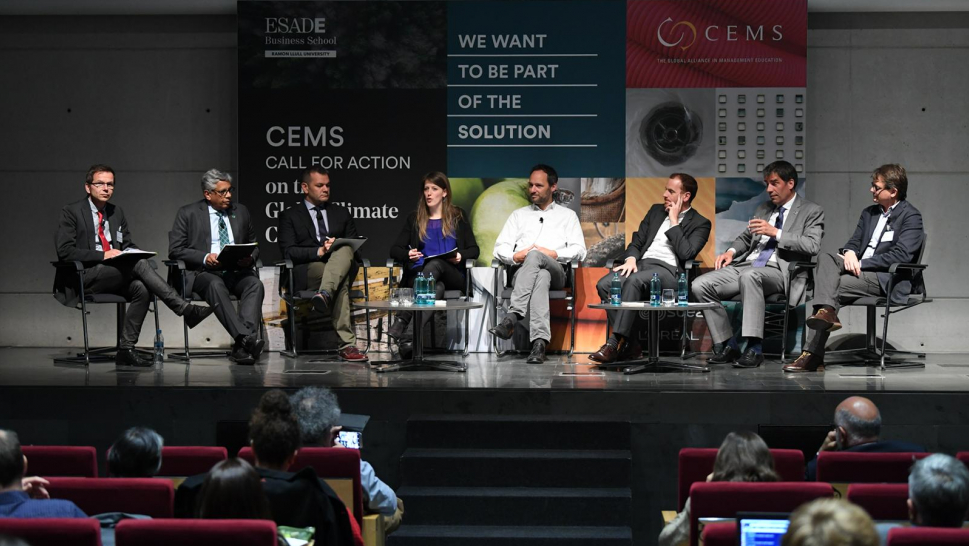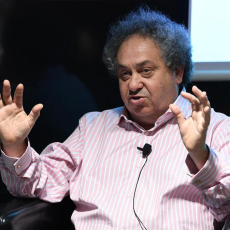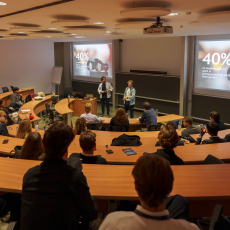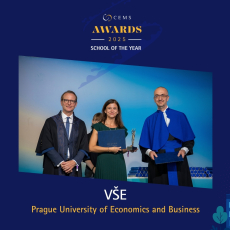A two-day simulation of UN climate negotiations in Barcelona kicked off yesterday (14 May) in Barcelona, involving 150 young future business leaders from nine leading European Business schools (33 nationalities) – currently studying the CEMS Master in International Management.
During the opening afternoon yesterday, participating students, the CEMS student board and alumni association, launched a call to the wider CEMS community (31 leading business schools, 73 multinational companies and 7 social partners) urging broader action to be taken on the global climate challenge.
Pieter Bosmans, President of the CEMS Student board, said:
“The CEMS student board is proud that together with the CEMS Alumni, we can launch this Call for Action on the Global Climate Challenge.
“Climate change is a global, persistent and important challenge of our time. Failing to address climate change puts people, communities, businesses, and nature at risk. As tomorrow’s business leaders, it is our social responsibility to address global challenges.
“For the past decade, CEMS has demonstrated thought leadership in business education on climate change. Since 2009, more than 700 students have participated in the CEMS Model UNFCCC climate change course and role play. Building on this successful achievement, we are calling upon all members of the CEMS Community to a much broader action to tackle climate change. By acting now, we want to be part of the solution.”
This year’s simulation was also kicked off by a high profile panel discussion, including representatives from multinational companies (CEMS corporate partners) and the Green Climate Fund (GCF), addressing what business schools can do to help solve the climate problem.
UN-backed simulation
During the simulation, the students are taking the roles of government, civil society and industry representatives from around the world. This unique educational initiative has the official backing of the United Nations Framework Convention on Climate Change(UNFCCC) and its Executive Secretary, Patricia Espinosa.
The annual Model UNFCCC, initiated in 2009 by the University of St. Gallen and ESADE in Barcelona, is now in its tenth edition and will take place one week after the official UN conference in Bonn. It consists of a semester-long course taught in parallel at all participating universities followed by the final negotiations in which all students come together at rotating locations.
The innovative simulation is an opportunity for CEMS Masters students to develop skills in dealing with one of the most urgent societal issues of our times, and to gain a deeper understanding of the role of business in contributing to global solutions for climate change.
Students must become essential part of the solution
Academic Director of the Model UNFCCC, Prof. Rolf Wüstenhagen, commented: “It is crucial that young people are educated on the key elements of climate change – science, evolving policy and the role of business – so that they can become an essential part of the solution. “Business education has a key role to play in developing a new generation of leaders who, in spite of turbulence on the international stage, can ensure rapid progress on addressing the global climate challenge.”
“The climate problem has been framed as mainly a global policy challenge, however it is clear that policy on its own cannot solve this problem. The business world can play an important role in leading the transformation towards a low-carbon world, because it has the capability and resources beyond anything else in society to innovate and develop new solutions.”
Roland Siegers, Executive Director of CEMS, added:
“Current worldwide uncertainty around climate change policy makes it even more crucial than ever for business leaders of the future to fully understand all aspects of negotiations that result in regulation of CO2 emissions.
“Our aim, through the model UNFCCC and corresponding course, is to ensure that these future leaders not only have a strong understanding of the interdependency of modern day business, policy and climate change, but that environmental responsibility is a baseline for the whole cohort. “If businesses are able to interpret and leverage the global leadership values around sustainability demonstrated by our students, then we will truly see a transformation in the business community and as a consequence the wider natural world.”
Eugenia Bieto, Director General at ESADE Business School and CEMS Chair, said:
“The fight against climate change must be a shared cause. It is not only the responsibility of politicians, governments, international administrations, companies or citizens. It is also the task of business schools to foster environmental awareness among their community. I’m proud to observe the commitment of our students and the initiatives they are taking part in. I also add my voice to their requests.”
Participating CEMS partner schools are: University of St Gallen (Switzerland), ESADE Barcelona (Spain), University of Cologne (Germany), Corvinus University of Budapest (Hungary), WU Vienna (Austria), Rotterdam School of Management (The Netherlands), Bocconi University (Italy), Stockholm School of Economics (Sweden) and the Warsaw School of Economics (Poland).
CEMS is a global network of 31 academic members (leading business schools), 73 corporate partners (multinational companies) and 7 social partners (NGOs), dedicated to educating and preparing future generations of international business leaders, through the top ranked CEMS Master’s in International Management.
More information can be found at www.modelunfccc.org. For more information or interviews, contact Rebecca Rosinski: rebecca.rosinski@cems.org.




